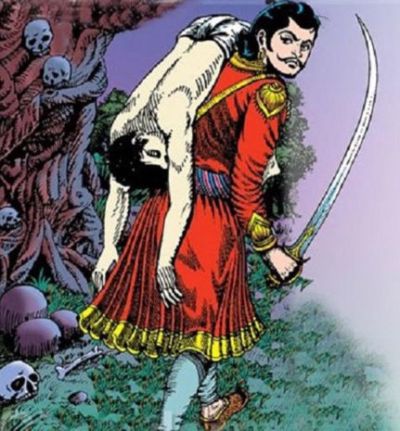But even though she was married, Arthadatta would not let his daughter leave his house and go to her husband’s, since she was his only child.
Maṇivarman was as distasteful to Anaṅgamañjarī as a bitter medicine to a sick man, she hated him.
But Anaṅgamañjarī was dearer than life to her husband, who loved her as much as a miser loved his hoarded wealth.

एकदा चान्तिकं पित्रोस् ताम्रलिप्तीं निजं गृहम् ।
उत्कण्ठादिनिमित्तेन मणिवर्मा जगाम सः ॥ १२,२८.११ ॥
ततो दिनेषु यातेषु तीक्ष्णसूर्यांशुसायकैः ।
प्रोषितानां निरुद्धाध्वा घर्मकाल इहाभ्यगात् ॥ १२,२८.१२ ॥
वसन्तविरहाद् उष्णा निःश्वासाः ककुभाम् इव ।
मल्लिकापाटलामोदमेदुरा मरुतो ववुः ॥ १२,२८.१३ ॥
उत्पेतुः पवनोद्धूता गगने रेणुराजयः ।
दूत्यो घनागमायेव प्रहितास् तप्तया भुवा ॥ १२,२८.१४ ॥
आकाङ्क्षिततरुच्छायाः कठोरातपतापिताः ।
पथिका इव यान्ति स्म चिरेण दिवसा अपि ॥ १२,२८.१५ ॥
चन्द्रांशुपाण्डुरुचयो गाढाश्लेषसुखप्रदम् ।
विना हेमन्तम् अगमन्न् अतिदुर्बलतां निशाः ॥ १२,२८.१६ ॥
Now once came a time when Maṇivarman longed to see his parents, and so set out to Tāmraliptī in order to visit them.
In a few days, summer arrived, and caused extreme discomfort to travellers who ventured away from their homes, with the sun’s rays feeling as sharp as arrows…
The winds carried with them the fragrance of jasmine, and it seemed to be the sighs of all of nature, at the departure of spring.
Lines of dust rose up and were carried by the winds to the skies, as if they were messengers sent by the heated earth, asking for the hastening of the approach of the clouds, so that the rainy season could offer some respite.
Days passed slowly, like traveller who were exhausted by the severe heat, and longed for the shade of the trees.
And the nights become shorter and shorter, and looked pale in the moonlight, as if becoming emancipated due to the lamenting of the passing of the spring.
तत्कालं चन्दनालेपधवला सा वणिक्सुता ।
संवीततनुकौशेयशोभितानङ्गमञ्जरी ॥ १२,२८.१७ ॥
ददर्श स्वगृहोत्तुङ्गवातायनगतैकदा ।
आप्तसख्या युता भव्यं युवानं विप्रपुत्रकम् ॥ १२,२८.१८ ॥
संचरन्तं रतिप्राप्त्यै नवोत्पन्नम् इव स्मरम् ।
कमलाकरनामानं पुत्रं राजपुरोधसः ॥ १२,२८.१९ ॥
सो ऽपीन्दोर् इव मूर्तिं तां कान्तां दृष्ट्वोपरि स्थिताम् ।
कुमुदाकरतां भेजे सानन्दः कमलाकरः ॥ १२,२८.२० ॥
तयोर् अभूद् अमूल्यं तन् मनःसंवननं तदा ।
स्मरगुर्वाज्ञया यूनोर् अन्योन्यस्यावलोकनम् ॥ १२,२८.२१ ॥
उन्मूलितह्रियौ तौ च दूरविक्षिप्तचेतसा ।
रजोभिभूतौ जह्राते मन्मथावेगवात्यया ॥ १२,२८.२२ ॥
दृष्ट्वा च मदनाविष्टः सख्या स कमलाकरः ।
सहस्थितेन नीतो ऽभूत् कथंचिद् भवनं निजम् ॥ १२,२८.२३ ॥
One day, in this cursed season, Anaṅgamañjarī was sitting with her close friend, next to a large window in her house. She had covered her body in sandalwood paste and was dressed in a thin silk garment.
As she watched the street below, she saw a young Brāhman, named Kamalākara (a collection of lotuses), the son of the royal priest, as he passed by.
He looked like Kamadeva, the God of Love, as if risen from the ashes, on his way to find his consort Rati.
And when Kamalākara gazed upwards, he saw Anaṅgamañjarī, looking as beautiful as the full moon, and in an instant felt like kumudākara (a collection of blossoming lotuses), and his heart filled with joy.
The sight of each other bound them into a fascination for each other, as if Kāma himself had brought them together. The two were overcome by passion, and they forgot everything else, and got carried away in the storm of their attraction.
Kamalākara’s friend, who was walking alongside him, saw that Kamalākara had fallen in hopeless love, and somehow managed to take him away from the scene, and to his own house.
to be continued…
